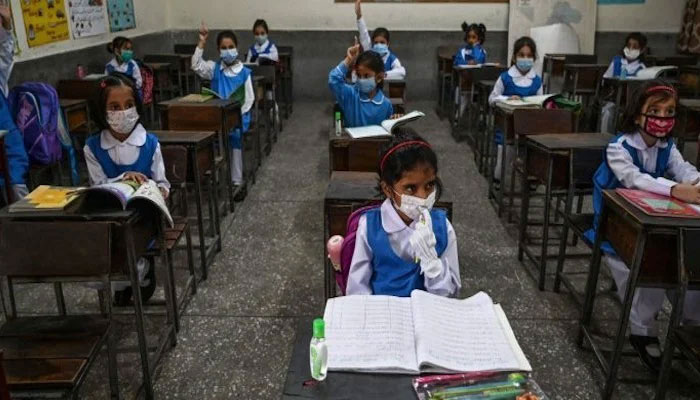Education reality
Pakistan ranks 130 out of 146 countries on the Education for All (EIU) index
If we were to analyze whether a country is serious about its progress and development, the best thing to do is to see how that nation performs on the education front. Pakistan ranks 130 out of 146 countries on the Education for All (EIU) index, highlighting the urgent need for necessary measures to turn around the education sector, which is important for the country’s growth. Another report uncovers the deep divisions in the sector. The Annual Status of Education Report (ASER) 2023, launched on Wednesday (March 27), has uncovered a dip in learning levels in rural Sindh, with “Sindhi/Urdu story reading of fifth graders slipping from 40 per cent in 2021 to 39 per cent in 2023.” Similarly, “22 per cent (23 per cent in 2021) of children could read a set of sentences fluently in English, and 27 per cent (28 per cent in 2021) could solve two-digit arithmetic divisions.”
The data shows the dismal state of education in Sindh; other parts of the country are no better, though. The report suggests that this unsatisfactory result could be an extension of learning losses caused by the Covid-19 pandemic. These losses were exacerbated by the 2022 floods when the province’s education structure underwent high-scale damage and destruction. The report also says that, while public schools are catering to the education demands of people, there has been a surge in demand for private schools. It also reveals an interesting point: school enrolment has increased by 10 per cent. But does this win have any impact on the overall state of education in the province? It does not seem so.
That Pakistan is facing an education emergency is an understatement. Educationists, including professors teaching at elite universities, have already warned the authorities concerned about similar learning losses. But, unfortunately, there have been no measures on the part of the government – both federal and provincial – to do something in this regard. This inaction has led to a situation where the rich and well-heeled use all of their resources to get their children a quality education, while the poor and the middle class remain far behind in the race. Hundreds of thousands of unemployed people with degrees from low-tier schools and colleges have nowhere to go because the system is inherently against them. Understaffed workplaces rarely make a bet on these people and prefer going with people who have studied at established universities. Even ministers prefer working with foreign graduates, completely ignoring the fact that people with local degrees are out of the race because of the failure of their governments, which could not set up credible institutions. Nations around the world have gone through the worst – atomic bombs, decades of war, natural disasters, etc – but all of them could bounce back because they considered education as their path to success. Pakistan has to do the same.
-
 Hailee Steinfeld Details Preparations Ahead Of Welcoming First Kid With Josh Allen
Hailee Steinfeld Details Preparations Ahead Of Welcoming First Kid With Josh Allen -
 Shocking Details Revealed About Gunman 'Austin Tucker' Shot Dead At Trump’s Resort 'Mar-a-Lago'
Shocking Details Revealed About Gunman 'Austin Tucker' Shot Dead At Trump’s Resort 'Mar-a-Lago' -
 Queen Camilla Meets Gisèle Pelicot, Sends Powerful Message To Victims As Andrew's Scandal Deepens
Queen Camilla Meets Gisèle Pelicot, Sends Powerful Message To Victims As Andrew's Scandal Deepens -
 Cancer-stricken King Charles At Breaking Point?
Cancer-stricken King Charles At Breaking Point? -
 Andrew Leaves King Charles No More Moves To Play: ‘Can’t Just Say We Got Nothing’
Andrew Leaves King Charles No More Moves To Play: ‘Can’t Just Say We Got Nothing’ -
 Sterling K. Brown Explains How Sharing His Kids' Photos On Social Media Can Keep Them Safe
Sterling K. Brown Explains How Sharing His Kids' Photos On Social Media Can Keep Them Safe -
 Keir Starmer Gives Major Advise To King Charles Amid Andrew Scandal
Keir Starmer Gives Major Advise To King Charles Amid Andrew Scandal -
 Nick Reiner Pleads Not Guilty In Famous Parents' Double Murder Which Shocked The World
Nick Reiner Pleads Not Guilty In Famous Parents' Double Murder Which Shocked The World -
 Benicio Del Toro On Losing Mom In Chldhood: 'I’m Still Dealing With It'
Benicio Del Toro On Losing Mom In Chldhood: 'I’m Still Dealing With It' -
 More Than 500,000 Without Power As Blizzard Hits US Northeast
More Than 500,000 Without Power As Blizzard Hits US Northeast -
 Winona Ryder Lands Secret Role In 'Wednesday' Season Three, Marking Reunion With Tim Burton
Winona Ryder Lands Secret Role In 'Wednesday' Season Three, Marking Reunion With Tim Burton -
 Andrew, Fergie’s Life Without The Bells And Whistles Turns Grimmer: ‘A Lot More Was Happening’
Andrew, Fergie’s Life Without The Bells And Whistles Turns Grimmer: ‘A Lot More Was Happening’ -
 Nicole Kidman And Keith Urban's Divorce Drama Deepens As Teen Daughters 'stick' By Their Mother's Side
Nicole Kidman And Keith Urban's Divorce Drama Deepens As Teen Daughters 'stick' By Their Mother's Side -
 William, Kate Desperate To Make Public Statement Distancing Themselves From Andrew
William, Kate Desperate To Make Public Statement Distancing Themselves From Andrew -
 Charli Xcx Details Boozy Second Wedding To The 1975's George Daniel: 'Everyone Was Hungover'
Charli Xcx Details Boozy Second Wedding To The 1975's George Daniel: 'Everyone Was Hungover' -
 Gracie Abrams Follows 'Kylie Jenner Playbook' With Paul Mescal Romance
Gracie Abrams Follows 'Kylie Jenner Playbook' With Paul Mescal Romance




